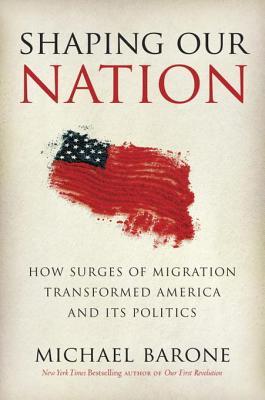
Shaping Our Nation
How Surges of Migration Transformed America and Its Politics
- اطلاعات
- نقد و بررسی
- دیدگاه کاربران
نقد و بررسی

August 26, 2013
Barone (Our First Revolution) reviews migration to the U.S. and its impact on American politics. In the 18th and 19th centuries, Scotch-Irish and English pioneers fanned across the continent in a “Yankeediaspora” and bestowed on it British laws, language, and religions. Barone catalogues the impact of European immigrants, from Italians to Slavs, Germans and Irish. In contrast to the rest of the nation after the Civil War, black and white Southerners remained relatively immobile and the region was populated mostly by native-born Americans. While Barone transcends clichéd Ellis Island narratives, his early chapters rehash textbook political history to a degree. The more impressive chapters deal with the post-1940 period, as Barone outlines black migration to the North and out-migration from Northern cities to the Sunbelt. The flow of Americans of all backgrounds to California, Florida, Texas, and other high-growth states added up to a national political game changer. Barone puts the best face possible on 50 years of substantial, mostly illegal Mexican immigration to the U.S. and explains why it happened. He reveals official cluelessness—or dishonesty—during the passage of the landmark immigration acts of 1964 and 1965. Barone’s sharp political instincts and ability to clearly explain demographic change make for a solid and lively account. 19 b&w maps. Agent: Glen Hartley, Writers’ Representatives.

September 1, 2013
The Washington Examiner's senior political analyst examines the internal and immigrant migrations that have "peopled" America. Few commentators have studied the history of American politics as thoroughly as Barone (Our First Revolution: The Remarkable British Upheaval that Inspired America's Founding Fathers, 2007, etc.), and he continues his life project here with a look at our constantly churning population, mass movements that have had a continuing effect on our politics. Picking up about where David Hackett Fischer's estimable Albion's Seed (1989) left off, Barone looks first at the antebellum spread of the Scots-Irish from the Eastern Seaboard to the Southeast and Southwest. He turns then to four other epochal surges: the first half of the 19th-century migration of New Englanders across upstate New York and the Midwest and of planter-class Southerners from the coast to the Mississippi Valley; the 1840-1890s immigrations of Irish Catholics and German Protestants; the mass movement from rural to urban America from the end of the Civil War to World War II; and the 1970-2010 immigration of Latin Americans and Asians to major American cities. Within these larger transformations, Barone pursues a variety of intriguing subplots--Andrew Jackson as the perfect embodiment of the American Scots-Irish, the unique, "annealing effect" of WWII, the role of air conditioning in repopulating the South, and the recent exodus from high- to low-tax states--and he emphasizes two recurring themes: the unanticipated beginnings and the rather abrupt endings of these mass migrations and the widespread unease, even fear, each development engendered. How could the republic possibly absorb these changes? Barone ably demonstrates how practiced the United States has become, how sturdy our constitutional framework has proven, at accommodating the religious, economic and cultural diversities that accompany vast, unexpected additions to and shifts within our population. As Congress once again debates immigration reform, Barone delivers a timely history lesson.
COPYRIGHT(2013) Kirkus Reviews, ALL RIGHTS RESERVED.




دیدگاه کاربران